Moringa, the Tree of Life: Fully Explained
“Miracle tree,” “tree of life,” “horseradish tree,” and “drumstick tree” are some of the names attributed to the moringa tree over the years due to its many health benefits. The moringa tree is among the most nutritious plants in the world, as moringa oleifera leaves, roots, oil, sap, fruit can be used to improve one’s health. Even moringa seeds, bark, flowers, and pods possess medicinal properties.
This tree packs a wide range of bioactive and nutritional compounds, such as carbohydrates, amino acids, vitamins, fiber, phytonutrients, and minerals, providing our bodies with several benefits. It’s typically found in Asia, South America, and Africa and is rich in antioxidants.
For many centuries, moringa has been used in ayurvedic healing and phytomedicine. In traditional medicine, the ancient Romans, Greeks, and Indian Mauryan warriors were reported to have taken moringa leaves to increase their strength and energy, particularly during war. Nowadays, moringa trees are cultivated and consumed worldwide.
What is Moringa?
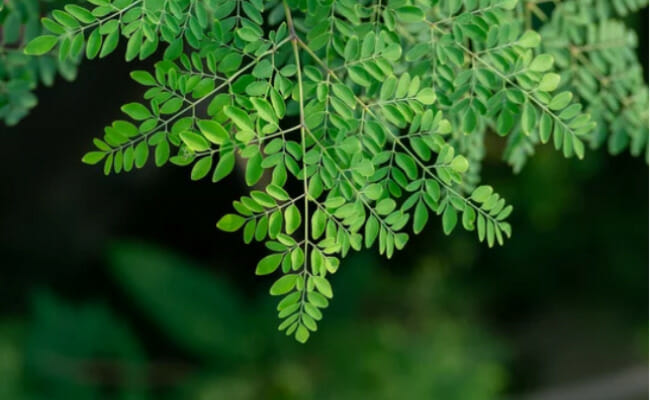
Moringa Oleifera is a plant that’s native to northern India and can also be cultivated in other tropical and sub-tropical regions like Africa and Asia. It’s referred to as a “miracle plant” in many circles due to its uses for years.
From the moringa oleifera leaves to its roots and flowers, everything can be used. Even moringa oleifera seeds have been used by folk medicine to remedy different conditions, such as diabetes, long-term inflammation, infections (bacterial, fungal, and viral), joint pain, heart issues, and even cancer.
Benefits of Moringa Plant
Moringa is believed to possess enormous health benefits, some of which are still confirmed by modern medicine. It has many uses, from beauty and health to disease prevention and cure.
The oral intake of moringa can cure illnesses like anemia, arthritis and joint pain, cancer, asthma, constipation, diarrhea, diabetes, stomach pain, ulcers, high blood pressure, heart problems, kidney stones, thyroid disorders, and other infections.
People also consume Moringa as an antioxidant and aphrodisiac to boost the immune system, prevent pregnancy, reduce swelling, and increase breast milk production. It is also a tonic or nutritional supplement and a diuretic (“water pill”).
When applied to the skin, there are even more health benefits of moringa. It can fight germs or as an astringent (drying agent). You can also use it to treat abscesses, dandruff, athlete’s foot, gingivitis (gum disease), snakebites, wounds, and warts. Moringa seed oil is used in foods, hair care products, and perfumes.
In some parts of the world, moringa is popular as an essential food source. This is because growing a moringa oleifera seed is cheap and easy, and a lot of vitamins and minerals are in its leaves even after drying them. After its oil has undergone extraction, the moringa seed extract is used in a “seed cake” as a fertilizer and water purifier.
Nutritional Value
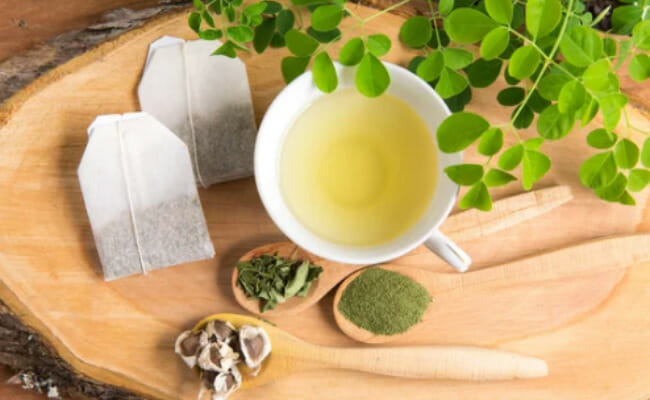
Almost all components of the moringa plant are edible and can be used as ingredients in herbal medicine. It is rich in micro- and macronutrients and other bioactive components essential for normal body function and disease prevention.
Regarding nutritional value, moringa leaves are far ahead of oranges, carrots, and even milk. They are an outstanding source of many minerals and vitamins, including vitamin A, B1 (thiamin), B2 (riboflavin), B3 (niacin), B6, C, Folate, magnesium, iron, phosphorus, zinc, calcium, and protein.
One cup (21 grams) of fresh leaves contains:
- Vitamin A: 9% of the RDA
- Vitamin B2 (Riboflavin): 11% of the RDA
- Vitamin B6: 19% of the RDA
- Vitamin C: 12% of the RDA
- Iron: 11% of the RDA
- Magnesium: 8% of the RDA
- Protein: 2 grams
Moringa leaves contain 18 amino acids. These essential amino acids are building blocks of proteins valuable to our health. Dried leaves are available in the US as dietary supplements, either in capsule or powder.
Fights Inflammation
Inflammation is the body’s natural response to infection or injury to protect and restore damaged tissue. Though it’s a protective mechanism, it may be responsible for several health problems, such as cancer and heart disease, if it persists over long periods.
Many vegetables, whole fruits, spices, and herbs possess anti-inflammatory properties. However, the amounts and types of anti-inflammatory compounds they contain will determine the degree to which they can help to fight inflammation.
Moringa contains anti-inflammatory compounds like phytonutrients, antibacterial, and antioxidants which help to target free radicals in the body and reduce oxidative stress and inflammation.
It is important to note two compounds: isothiocyanates, which have anti-inflammatory effects and aid in detoxification, and quercetin, a powerful antioxidant, and anti-inflammatory agent. A study proposes that the antioxidant properties of these two compounds in moringa may help relieve low-grade inflammation linked to chronic illnesses.
Rich in Antioxidants
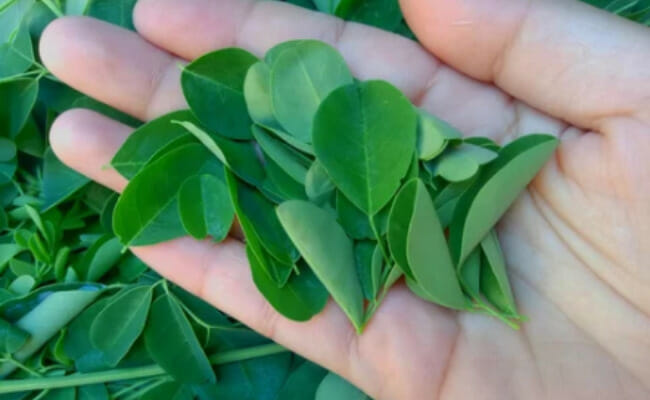
Antioxidants act against free radicals, which may otherwise lead to oxidative stress associated with chronic illnesses like type-2 diabetes and heart disease. Studies found that the leaves of the moringa contain many antioxidant plant compounds.
These antioxidants include chlorogenic acid, which may help to regulate blood sugar levels after meals, and quercetine, which may help to reduce blood pressure. You can also use moringa oleifera leaves extract as food preservatives by reducing oxidation to increase the shelf-life of meat.
Increases Energy
Including moringa in your morning routine can give you a caffeine-free energy boost. Its high minerals and vitamin content, particularly vitamin C, D, and iron, are concerned with energy-yielding metabolism.
Moringa also has B vitamins that help sustain lasting energy and support a healthy metabolic process. Amazingly, you won’t experience any anxiety, jitters, or energy crashes commonly associated with caffeinated beverages.
Moringa may also reduce stress and increase sexual function. Stress can diminish libido by decreasing dopamine (the feel-good hormone) and increasing cortisol. Sexual function is an intricate process involving the brain, emotions, hormones, muscles, and nerves that stress can affect.
People have used many aphrodisiac herbs for ages to improve libido, and moringa may be one of them. According to a study on animals, the leaves of the moringa may improve male sexual dysfunction caused by stress. But further research would have to confirm this in humans to draw strong conclusions.
Supports Cognition and Mood
There are extensive ongoing studies on moringa extracts and how they enhance mood and cognition due to their high vitamin and amino acid content. Moringa contains tryptophan, which is an antecedent to serotonin – referred to as the happiness hormone.
This happiness hormone operates in your brain’s reward centers to improve motor function, learning and memory. Both vitamins C and E found in moringa are strong antioxidants that help to lower oxidative damage to the brain, which is responsible for some cognitive issues.
Balances Blood Sugar
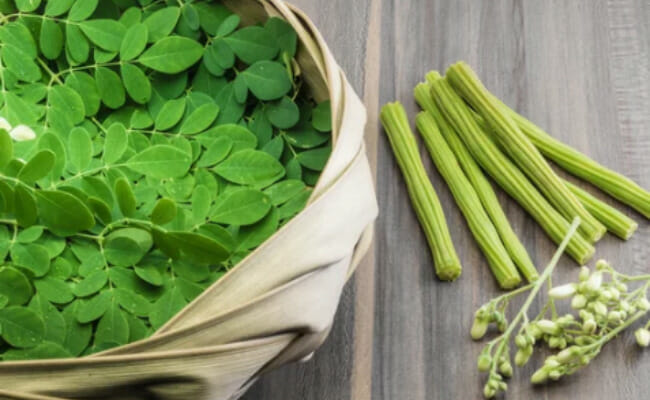
High blood sugar can cause major health issues and is the main attribute of diabetes. Over time, this sustained level of high blood sugar can lead to heart disease and organ damage. Therefore, it’s important to ensure your blood sugar is at a healthy level.
Moringa has proven to balance blood sugar levels due to its isothiocyanates and chlorogenic acid components. Chlorogenic acid can regulate blood sugar in the body by moderating cell uptake or glucose (sugar) release after meals.
Several studies have revealed that moringa aids blood sugar balance and positively affects fasting blood sugar and insulin levels, HbA1c, and overall blood glucose control in people who consume moringa oleifera leaf powder.
Anti-Aging Properties
The surplus nutrients and antioxidants in moringa enhance the health and look of skin and hair. They make the skin supple and add shine to the hair. With over 30 antioxidants, the leaves of the moringa can help reduce wrinkles and fine lines on the skin.
These antioxidants, including polyphenols and flavonoids, may help to fight premature wrinkles on your skin and keep you looking youthful. Several studies suggest that moringa has strong anti-inflammatory effects and promising anti-aging benefits on the skin.
In addition, applying a paste of crushed moringa leaves on the scalp and hair can help to reduce dandruff and revive dull hair. They also support hair follicles and are good for skin prone to acne. For these reasons, moringa is present in many cosmetics.
Helps with Digestion
Moringa contains fiber that protects against digestive problems like bloating, constipation, gas, ulcerative colitis, and gastritis. Also, Moringa leaves possess antimicrobial and antibiotic properties and many B vitamins, making them a suitable remedy for digestive issues.
Moringa leaves have both insoluble and soluble fibers with many benefits supporting digestion. While soluble fiber turns to gel after dissolving in water, slows digestion, and keeps you fuller for longer, insoluble fiber adds bulk to stool, reducing constipation and making it easier to go through the digestive tract.
Moringa contains certain compounds that help promote healthy gut bacteria growth.
Improves Cholesterol
Besides oats, almonds, and flaxseeds, moringa is a reliable remedy against high cholesterol. Healthy cholesterol levels are crucial to preventing heart disease, and consuming moringa leaves has substantially improved high cholesterol levels.
One study suggests that moringa contains antiatherescotic (prevents plaque buildup in the artery walls) and hypocholesterolemic (lipid-lowering) activities necessary for a healthy heart. Pregnant women usually have increased cholesterol levels that can result in gestational diabetes. Adding moringa leaves to their diet can help to remedy this.
Side Effects of Moringa
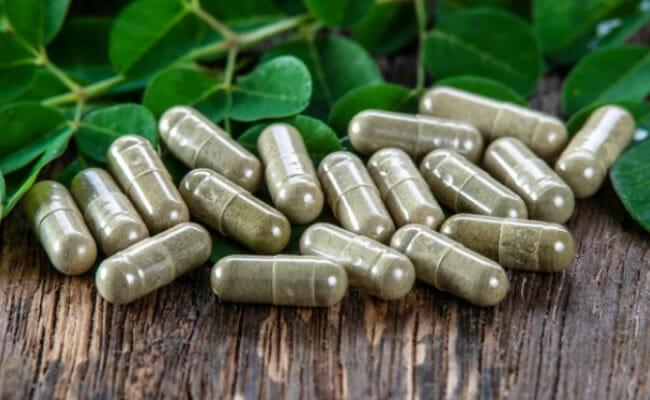
Scientists and nutritionists generally consider moringa to be healthy and safe for most people, but it may act as a laxative, and people may experience digestive issues when consumed in large quantities. The bark, roots, and flowers can cause uterine contractions in pregnant women.
Pregnant women should seek their doctor’s advice before including moringa extracts in their diet. Likewise, breastfeeding women should avoid taking moringa since it’s uncertain if any of its compounds can pass to the child through breast milk.
Studies show that some moringa products contain high levels of lead. People on blood thinners should avoid moringa until they’ve contacted their doctor. In general, moringa is safe when consumed in moderation.
It’s important to know that moringa may interact with some medications. When starting, it’s advisable to take only small doses, like half to one teaspoon daily. However, consult your doctor before adding moringa to your daily routine.
Thyroid medicines: Moringa may increase thyroid function, so you shouldn’t take it with other thyroid medications like Levothyroxine.
Medications broken down by the liver: Moringa may delay the medicine breakdown in the liver, resulting in more health issues.
Diabetes: Diabetes medications and moringa can lower blood glucose. Consuming both together may significantly reduce the levels of blood sugar.
Blood pressure: Moringa can lower blood pressure and may cause it to drop significantly if taken with such medication.
How to Shop for Moringa
Moringa is readily available in the US as a supplement in powder or capsule form. Remember to read the instructions on how to use the product safely. Moringa leaves and pods are also available on the international market.
It would be best to get only 100% pure organic moringa leaves when purchasing moringa products. You should store moringa leaf extracts in an air-tight container and in a cool and dark environment. Also, the best time to consume moringa is within six months of harvesting, so ensure to check the shelf-life and expiry date of the product.
How to Use Moringa Powder
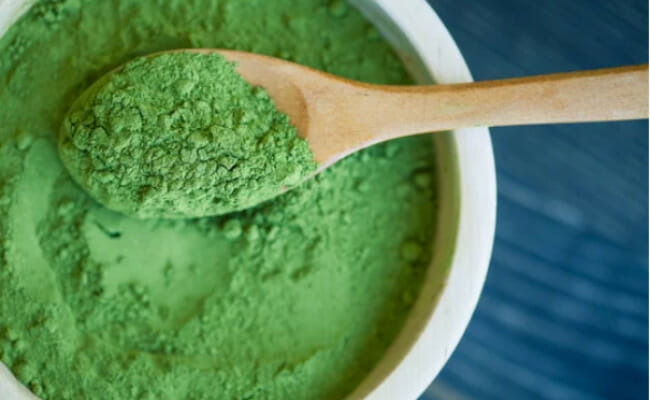
You can include moringa leaf powder in many recipes, such as meals, beverages, and snacks. It tastes just like matcha (grounded green tea) and has a grassy, earthy, or green flavor.
While some people enjoy the taste of moringa leaf powder, others prefer it combined with sweeter and stronger flavors. Here are some ideas you can try:
- Add to hummus
- Include in your morning smoothie
- Add to salads and soups
- Add to your favorite dip or guacamole
- Add moringa leaf powder to pesto or a pasta sauce
- Bake into cakes and cookies
- Add to hot water, plus your favorite sweetener for tea
Can Moringa Support Weight Loss?
There is evidence that moringa oleifera leaf extract can effectively manage weight gain in mice. Since moringa leaf extract has rich B vitamins aid digestion, it can help the body convert food into energy rather than store fat. Besides, moringa can aid weight loss, reduce fatigue and boost energy levels.
Conclusion

Generally, moringa is full of nutrients that offer numerous health benefits when taken regularly. This “drumstick tree” is versatile and has anti-inflammatory properties, which help to protect the body and make it a good addition to many recipes.
Their antioxidative and cellular protective properties make them a “superfood.” They can reduce inflammatory enzyme production and sugar levels, and including them in your diet can reap many benefits for your health. Remember to speak to your doctor before you begin.







